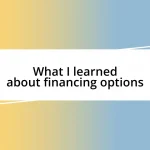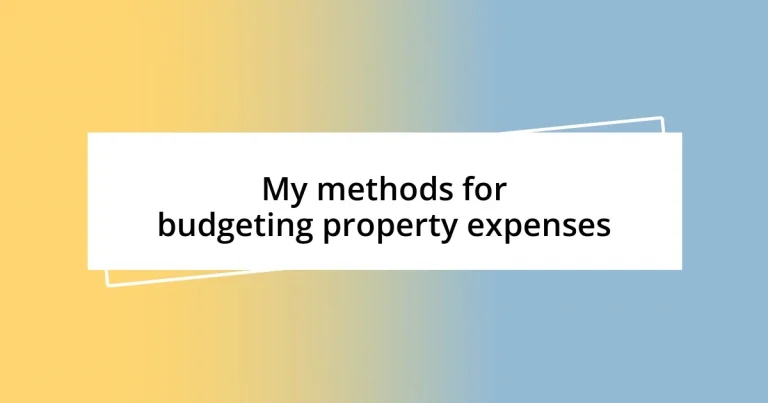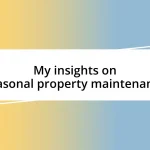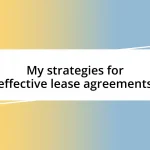Key takeaways:
- Understanding and categorizing property expenses into fixed and variable helps create a comprehensive budget and prepare for unexpected costs.
- Utilizing budgeting tools and apps enhances expense tracking and fosters collaboration, making financial management more interactive and effective.
- Regularly reviewing and adjusting the budget can uncover hidden savings and empower proactive financial decisions that positively impact property investments.
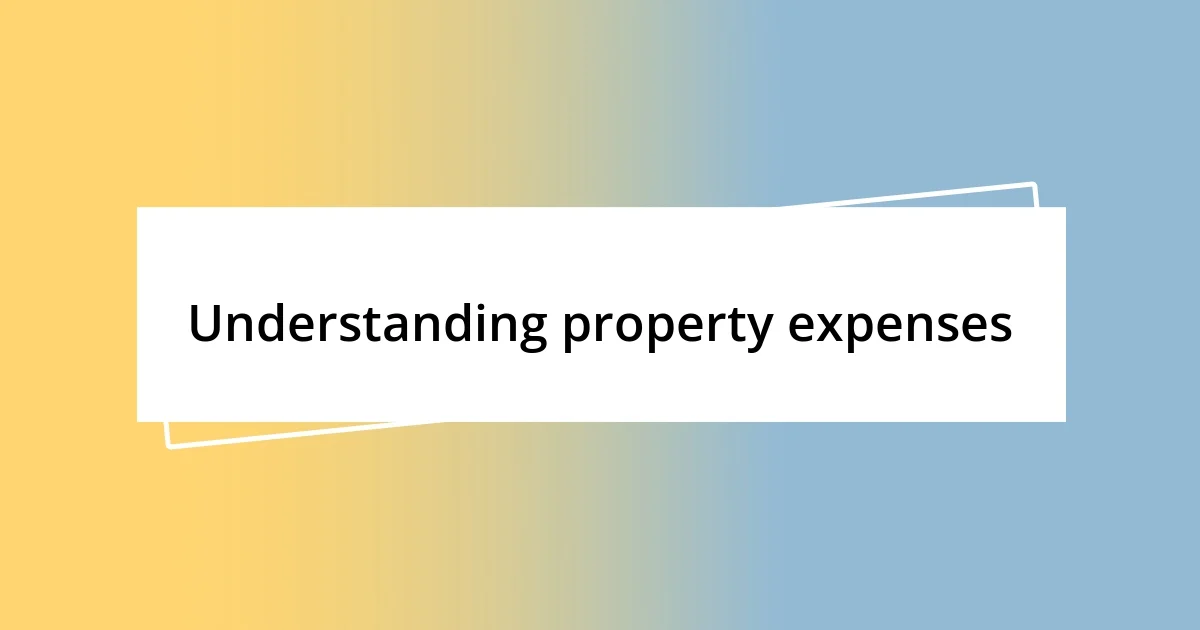
Understanding property expenses
When I first delved into property investment, I quickly realized how essential it is to fully understand the different types of expenses involved. It’s not just about the monthly mortgage payment; there are taxes, insurance, maintenance, and unexpected repairs that can catch you off guard. Have you ever had to scramble to cover a major plumbing issue in the middle of winter? That moment taught me to look beyond the obvious costs.
I’ve learned that breaking down these expenses into fixed and variable categories helps paint a clearer picture. Fixed expenses, like property taxes and insurance, are pretty predictable. But variable costs, such as those pesky repairs or even handyman services after a tenant moves out, can fluctuate and require a contingency fund. It’s nerve-wracking to think what might come next, but having a budget set aside for surprises offers peace of mind.
Additionally, I’ve found that documenting these expenses regularly can illuminate spending patterns and help in forecasting future costs. When I started tracking my expenses in a spreadsheet, I was surprised to see how much those little things added up—things I hadn’t even considered initially. Isn’t it amazing how a comprehensive look at your finances can transform your understanding and approach to property management?
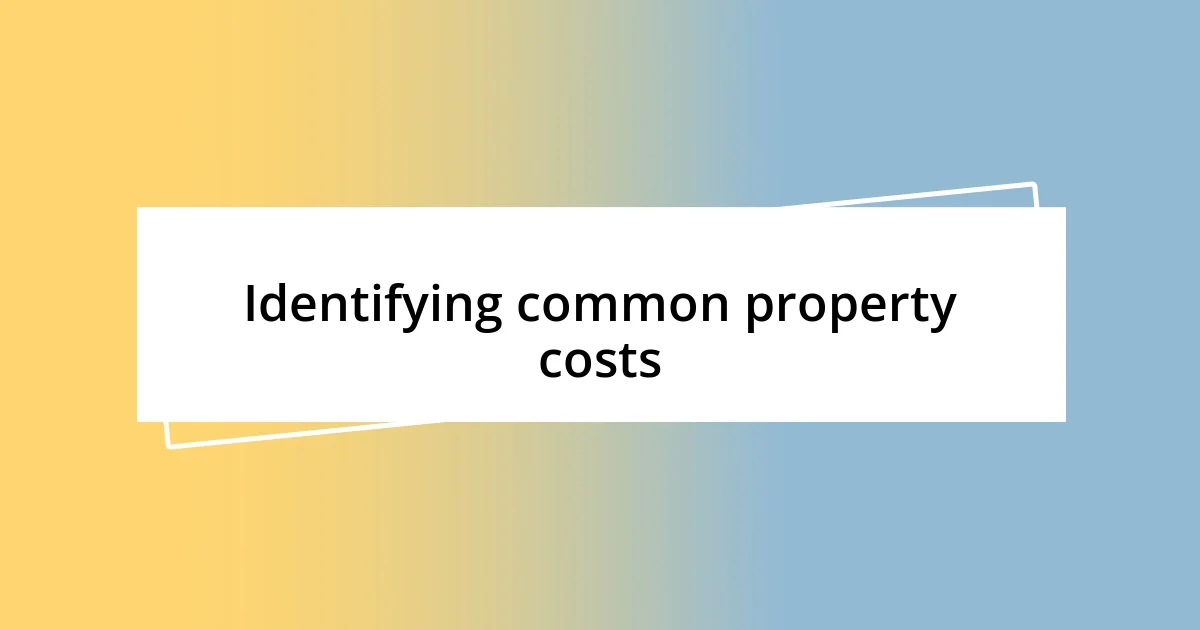
Identifying common property costs
Identifying common property costs is crucial for any investor. One significant category is recurring expenses like property taxes and insurance. I remember the first time I faced a property tax bill; it felt like a punch to the gut! These costs can vary depending on the location and value of the property, and they require careful monitoring to avoid unpleasant surprises.
Another critical aspect involves maintenance and repair costs. I often found that I underestimated these expenses, especially during that chilly winter when my property needed urgent HVAC repairs. It’s essential to anticipate the need for regular maintenance, such as landscaping or pest control, alongside the unexpected emergency repairs. This way, you’re not left stressed at the last minute, scrambling for funds.
Don’t forget about utilities and management fees, too. In my experience, these can sneak up on you if you’re not vigilant. I once lost track of electricity expenses at a rental property; the bills jumped significantly due to a new tenant who didn’t care much about turning off lights. Keeping an eye on these can make a substantial difference in your budget.
| Expense Type | Description |
|---|---|
| Recurring Expenses | Property taxes and insurance that are predictable and consistent. |
| Maintenance Costs | Regular upkeep and unexpected repairs that can vary widely. |
| Utilities | Electricity, water, and gas fees that depend on usage and tenant habits. |
| Management Fees | Costs associated with hiring property management services for rental properties. |
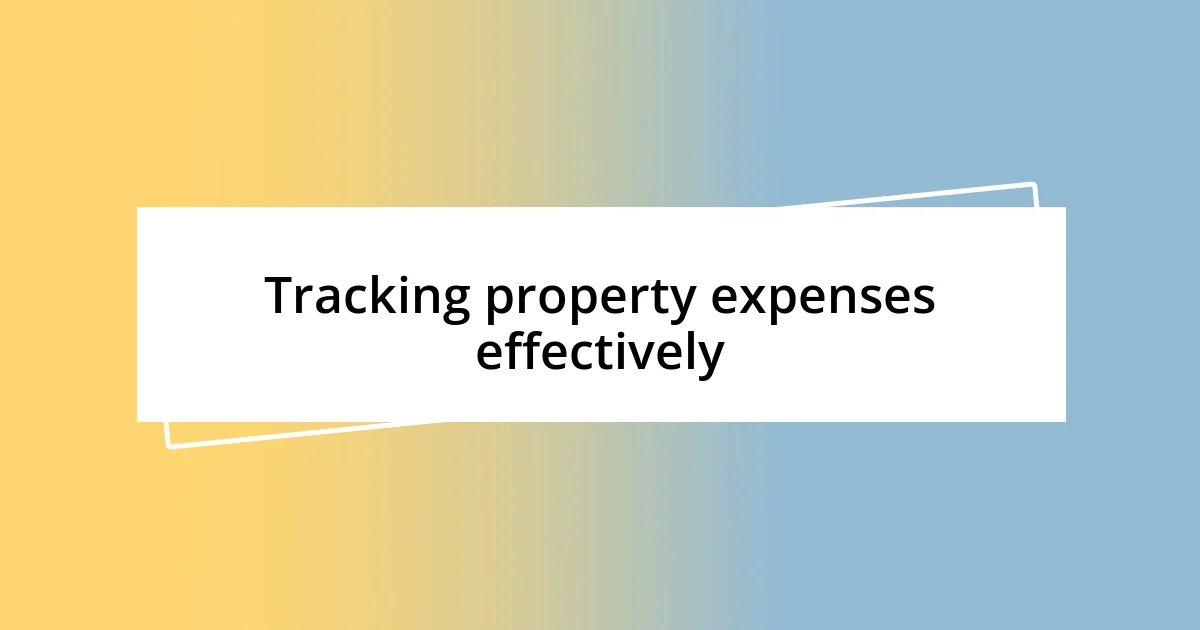
Tracking property expenses effectively
Tracking property expenses effectively requires a solid routine and a keen eye for detail. I’ve made it a point to check my expenses weekly, and believe me, this habit has saved me from countless surprises. When I first started tracking, I was shocked to find that small, seemingly trivial expenses—like those seasonal lawn care services—were eating into my budget more than I realized. By keeping a close tab and reassessing my expenses regularly, I not only curtail wasted spending but also identify areas for improvement.
Here are some methods that have worked wonders for me in tracking property expenses:
- Use Comprehensive Software: I recommend using property management software that allows you to categorize and analyze your spending easily.
- Maintain a Dedicated Expense Journal: I keep a dedicated notebook where I write down every expense, big or small. This helps me stay conscious of my spending habits.
- Set Up Alerts for Recurring Payments: I always ensure that I get reminders for utilities and mortgage payments, so I’m never caught off guard.
- Review Monthly Statements: I make it a practice to review my monthly bank and credit card statements, cross-referencing notable expenses to ensure they align with my budget.
- Engage with an Accountant: In the past, I didn’t realize the value an accountant brings until I started meeting with one. Their insights into property-specific deductions have helped me maximize my budgeting strategies.
By integrating these techniques, I find that I’m not just keeping track of where my money goes; I’m actively refining my budgeting process to build a more sustainable future for my investments.
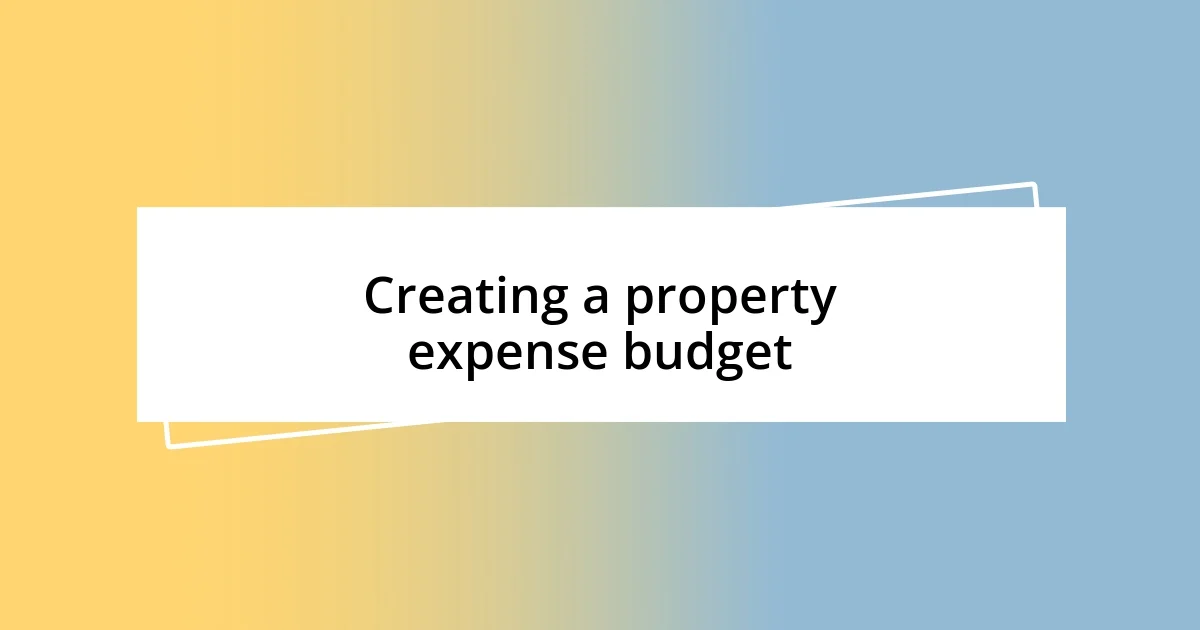
Creating a property expense budget
Creating a property expense budget starts with understanding your unique financial landscape. I recall meticulously listing all anticipated costs for a new rental property, feeling a mix of excitement and anxiety. It was eye-opening to realize how many smaller fees add up; did you know that things like HOA fees or snow removal can be easily overlooked? These overlooked costs can quietly creep into your budget, so it’s crucial to account for them.
Establishing a budget involves more than just listing expenses—it’s about creating a realistic plan that aligns with your income. One strategy that has worked well for me is categorizing expenses, which allowed me to see where I could cut back. For instance, after analyzing my budget, I noticed my lawn care expenses were consistent but didn’t bring the value I expected. I ended up managing it myself in the summer, not only saving money but also spending quality time outdoors. Have you considered which areas you could manage without a service?
Lastly, it’s essential to revisit and revise your budget periodically, especially after significant property changes. After my first year renting out a property, I took a hard look at repair costs and quickly recognized I needed a larger cushion for unexpected repairs. This lesson in adaptability turned into an ongoing practice where I adjust my budget based on historical data. It requires a bit of diligence, but trust me, staying proactive makes all the difference in ensuring your financial peace of mind.
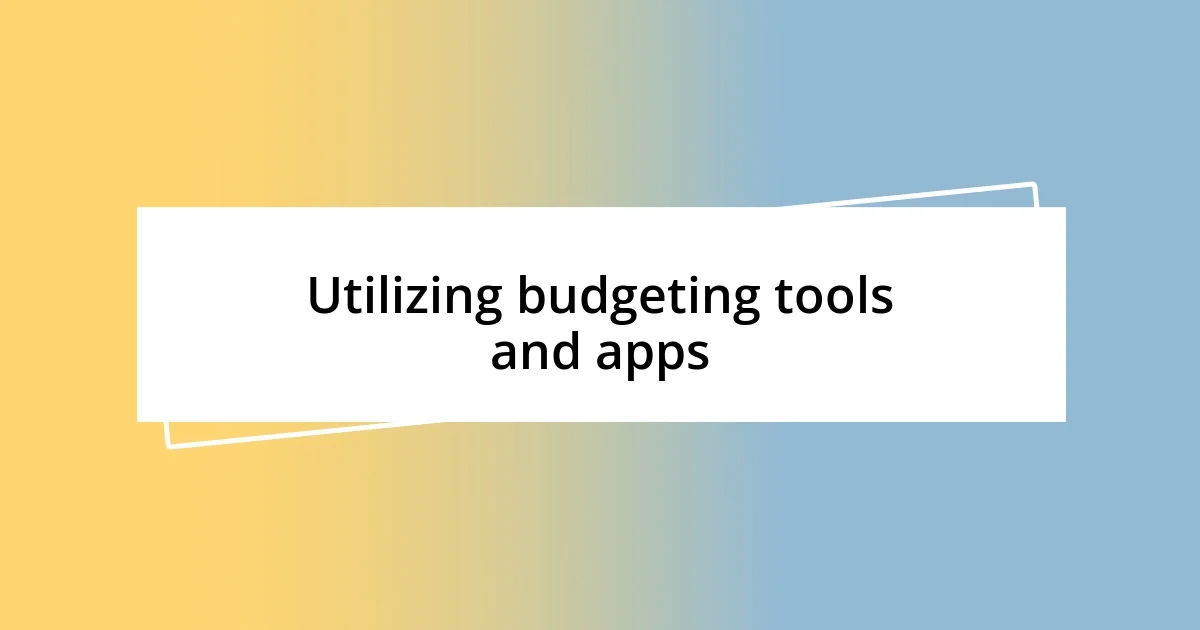
Utilizing budgeting tools and apps
Utilizing budgeting tools and apps can significantly enhance how I manage property expenses. I remember the first time I downloaded a budgeting app; it was like flipping a switch. Suddenly, my expenses weren’t just numbers on a spreadsheet, but dynamic reports that showed me trends and potential savings. Have you ever wondered how much easier it could be to visualize your spending? For instance, using a tool that allows you to set spending limits has nudged me to become more mindful of my expenses.
One app that stands out is Mint, which aggregates all financial accounts in one place. I was pleasantly surprised by how it categorized expenses automatically, making it easier to spot areas where I could cut back. Every time I receive a notification about exceeding a budget category, I feel a mix of accountability and motivation to adjust my spending habits. I genuinely believe that these tech tools can make budgeting a more interactive and engaging experience.
Moreover, some platforms offer collaboration features, which help if you’re managing properties with a partner. I’ve found that sharing access to our budgeting app fosters transparent discussions about finances, eliminating misunderstandings and keeping us on the same page. Have you considered utilizing apps that allow for partnership features? In my experience, it not only strengthens our budgeting process but also our relationship, as we celebrate small victories and tackle challenges together.
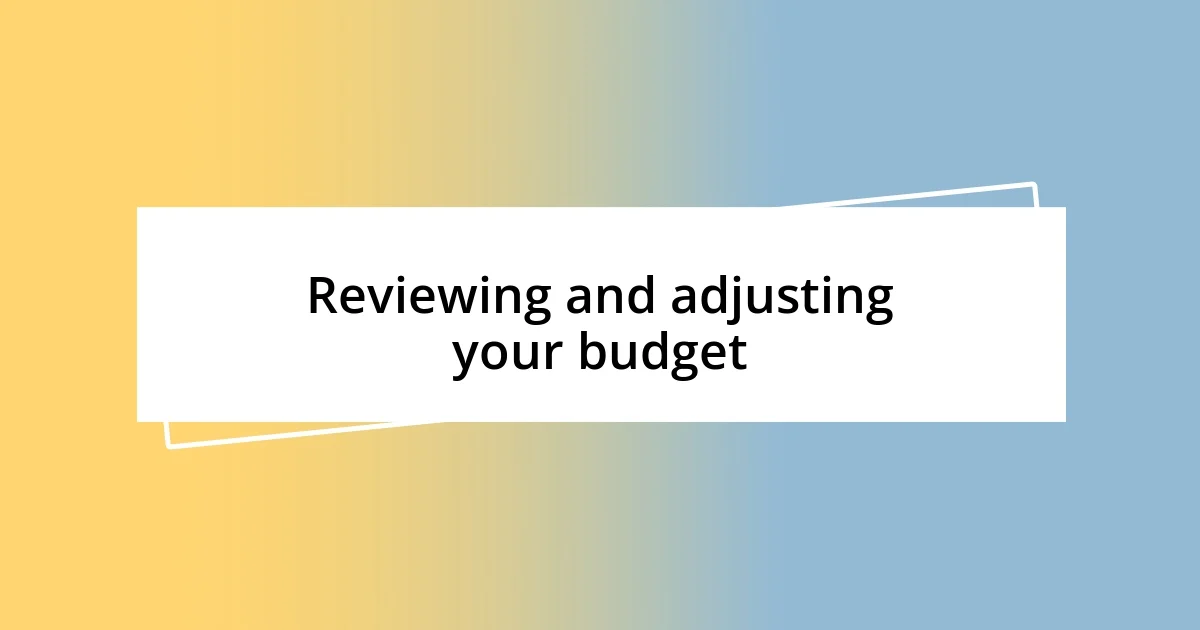
Reviewing and adjusting your budget
It’s easy to skip over budget reviews when life gets busy, but I’ve discovered that it’s a crucial practice. Last year, I had a surprising revelation after taking a step back to analyze my monthly expenses. I found recurring charges for services I no longer used, which was like uncovering hidden treasure! Have you taken the time to dig into your own budget lately? A simple review can reveal savings that transform your entire financial landscape.
Adjusting your budget isn’t just a reactive measure; it’s an opportunity for proactive growth. I remember feeling initially intimidated by the prospect of reassessing my costs every few months. But I made it a regular ritual, akin to spring cleaning my finances. Each time, I’d look at trends and ask myself hard questions: Is this expense still relevant? Am I getting the best value? Over time, this practice not only helped me save but also empowered me to make informed decisions about my properties.
Sometimes, the adjustments I’ve made have had emotional impacts that I didn’t expect. For instance, after realizing I could manage some tasks on my own, I felt a newfound sense of control and satisfaction. It’s about seeing that your budget isn’t set in stone. Rather, it’s a living document that evolves with your financial journey. How often do you check in on your financial health? I’ve learned that regularly tweaking my budget can lead to a stronger and more empowered mindset around my property investments.
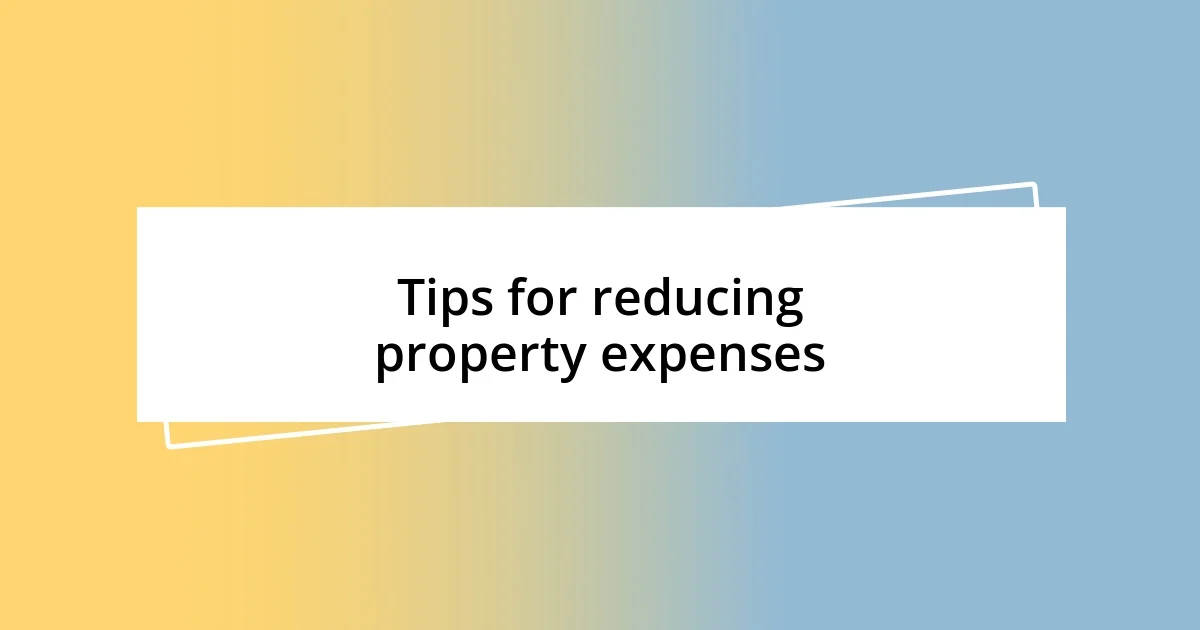
Tips for reducing property expenses
One effective strategy for reducing property expenses is to renegotiate contracts with service providers. I vividly recall the moment when I contacted my internet provider to discuss my monthly bill. I felt a mix of nervousness and hope, and after a friendly conversation, they offered me a better deal just because I expressed my intent to downgrade my service. Have you ever thought of simply asking for a better rate? It’s amazing what a little negotiation can do for your bottom line.
Additionally, considering energy-efficient upgrades can lead to significant long-term savings. I remember when I installed LED lighting throughout one of my properties. Initially, I hesitated due to the upfront cost, but knowing it would lower utility bills made the investment worthwhile. Have you looked into energy-efficient options for your properties? Over time, I’ve found that these upgrades not only cut my costs but also contribute to a more eco-friendly lifestyle, which gives me a sense of pride.
Another clever approach is to tap into local community resources. I once discovered a neighborhood group that facilitates skill-sharing among residents, allowing me to trade services instead of hiring outside help. This not only saved me money but also helped foster connections within my community. Have you explored similar opportunities in your area? Engaging with your neighbors can uncover hidden gems that make a substantial difference in your property expenses while building a sense of community.




